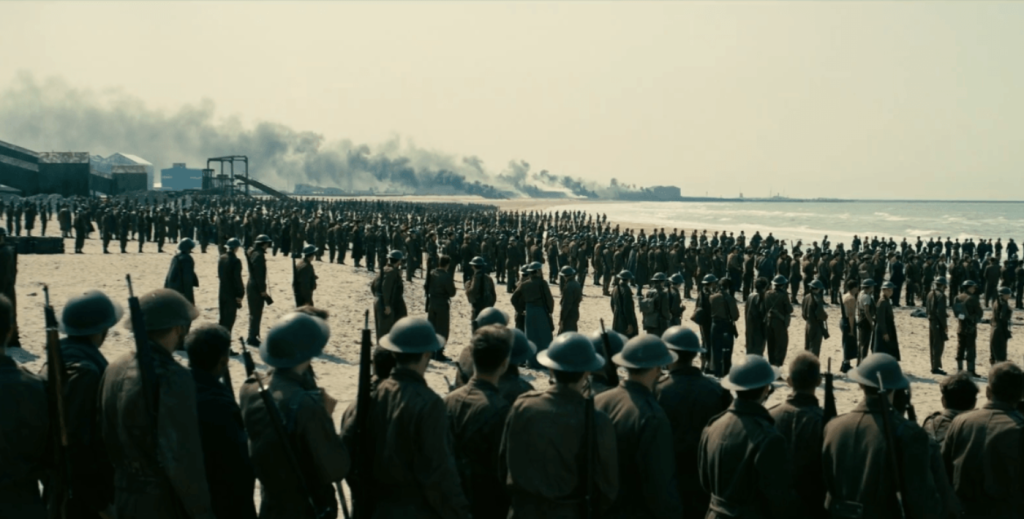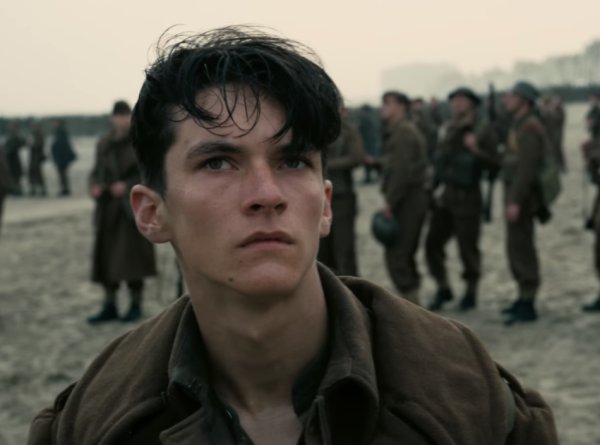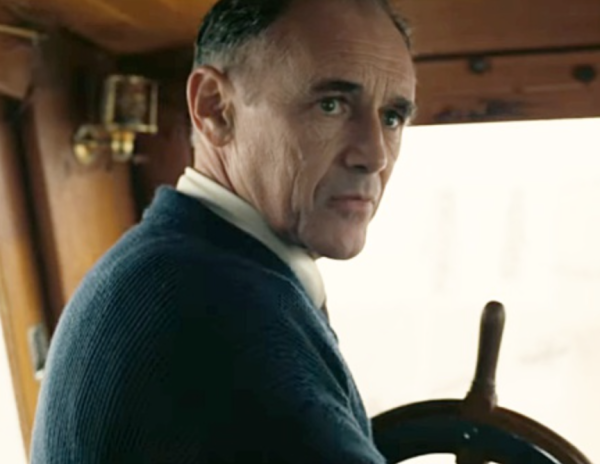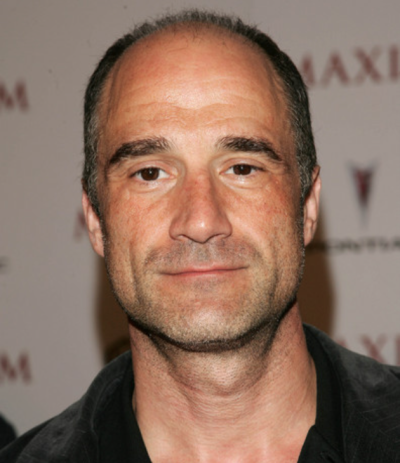Genre: War Drama
Premise: (from IMDB) Allied soldiers from Belgium, the British Empire and France are surrounded by the German army and evacuated during a fierce battle in World War II.
About: After Interstellar, people were wondering if Christopher Nolan had lost his mojo. So the film-loving Netflix-hating secretive director decided to reinvent himself by writing his first war movie. It’s been awhile since anyone opened a big-budget serious film during the summer months, making a July release for Dunkirk a bit of a gamble. But the flick made 50 million dollars over the weekend. Not bad for a movie with zero superheroes.
Writer: Christopher Nolan
Details: 1 hour and 45 minute running time
Remember Lessthanstellar, Christopher Nolan’s last film?
I do. It was a messy sci-fi catastophe that fell apart the further into its 8 hour running time it got.
And it’s responsible for teaching us today’s first screenwriting lesson.
Movies work better with tighter timeframes.
Without getting into specifics, the longer your timeframe is, the more room there is to screw things up.
This is why Dunkirk is a masterpiece compared to Nolan’s last film. By focusing on a brief timeframe of only one week, the story is able to charge forward and tell a tense tight story. Now Nolan plays around with that timeframe, which is something we’ll get into. But if you guys leave this review with anything, leave knowing that a tight timeframe improves your chances of writing a good movie.
For those of you who have no intention of seeing Dunkirk, I’ll summarize it for you. It’s about a famous moment in World War 2 where 400,000 (mostly British) Allied troops were stuck on a French (?) beach waiting for extraction. The problem was, supply ships and army vehicles were stretched thin, leaving these soldiers sitting ducks for enemy planes to swoop in and bomb them.
Nolan divides his focus into three storylines. There’s the soldiers on the beach, represented by baby-faced soldier Tommy, who attempts to get off the beach by any means possible. There’s three fighter pilots, led by Farrier, doing whatever they can to keep enemy airplanes from bombing the beach. And there’s a civilian ship that’s aiding the rescue mission, led by old-timer Mr. Dawson.
But Dunkirk is no straight-forward mission. Farrier’s storyline starts 1 hour before the rescue. Mr. Dawson’s storyline starts 1 day before the rescue. And Tommy’s storyline starts 1 week before the rescue. Nolan then cuts these storylines up non-linearly. For example, Mr. Dawson will save a soldier from a sunken boat, only for us to see that same soldier a few scenes later, getting onto that boat before it sank.
If you’re looking for ammunition to attack Dunkirk, that would be where you’d start. The other day we were talking about taking chances. One of the options, I explained, was playing with time. And Nolan’s done that here. The question is, did he need to? Would the movie have played the same, or better, had he told it linearly?
Nolan is notorious for something I’m going to call the “binary viewing experience.” He believes that a straight-forward story is boring. For a story to work, your mind should be working on two different levels. Here we have the story of soldiers trying to get off a beach before being massacred. But while this is happening, our brain is ALSO attempting to re-order the out-of-order narrative.
I was against this choice at first and I’ll tell you why with an analogy. In football, when the other team starts using trick plays, it means they don’t believe they’re good enough to beat you straight up.
The same can be said with storytelling. Once the writer starts trying to do all this weird tricky shit, it’s an indication that they don’t think the story is good enough to work on its own.
The one amendment to this is when the writer has a specific reason for why they’re incorporating trickery. 500 Days of Summer, for example, used its time-jumpy format to draw attention to the chaos of relationships. By showing us a perfect date (Day 30 of the relationship) mashed up against a brutal fight (Day 230 of the relationship), we were able to look at relationships in a way that wouldn’t have been the same had we traversed the 200 days between those two moments.
So I was trying to figure out if Nolan was trying to distract us from a story that would’ve been boring otherwise, or if there was a method to the madness.
I’m still not sure what the answer is. I suppose the jumping around makes the story slightly more interesting than it would’ve been otherwise. But I’m not convinced it was necessary. At no point did I think, “Oh, there’s NO WAY this movie works if you don’t tell it out of order.” And if that’s the case, then why tell it out of order?
While time-manipulation may be the major geek talking point of Dunkirk, I was far more interested in the sparse storytelling and lack of traditional character development.
Nolan ONLY has his characters speak when they have to, leaving large swaths of his canvas dialogue-free. And I thought it was great.
We’ve become way too dialogue-dependent as an industry and that’s because it’s easier! It’s easy to patch in some on-the-nose conversation to move the story along. It’s MUCH HARDER to figure out how to get through a potentially confusing section with images and actions alone. Which is why writers avoid it.
For example, Tommy and another soldier, Gibson, run into each other at the beginning of the story near a dead soldier’s body. This is followed by a bombing scene, a bunch of soldiers on the beach getting injured, and then those injured soldiers getting priority evac onto the only ship leaving the beach at the moment.
We then see Tommy and Gibson carrying their “injured” soldier in order to cut through the lines and get onto that ship. There is never a word spoken between the two about their plan. We experience it dialogue-free.
Had this been any other script, I assure you we would’ve gotten a scene – maybe even two – with Tommy and Gibson discussing their plan. “I have an idea.” “What?” “We can cut through the lines if we pretend he’s injured.” “But what if they catch us?” “Who’s going to check?”
Also, when you don’t do dialogue, you force yourself to build characters through actions and choices, which is always the most effective way to do so. Consider Tommy, who’s willing to pretend a dead man is injured to cut his fellow soldiers and get out on that first boat. That tells us so much about the character without saying a word.
With that said, dialogue-free scenes should be saved for situation-dependent scenarios. For example, when a group of guys needs to escape a building that’s being bombed, you don’t need dialogue for that scene. But when it comes to large plot points, going dialogue-free doesn’t make sense.
And that was my one big beef with Dunkirk.
I didn’t understand, for example, why they were on this beach. Had they just won a battle? Had they just retreated from a battle? I didn’t even know what country they were in, to be honest. I also didn’t understand why, if they were “surrounded” like the flyers said, that the Germans didn’t attack. There’s a throwaway line from one of the generals explaining, “Why waste tanks and troops when they can just shoot fish in a barrel with their planes?” Okay, that would make sense… IF THERE WERE MORE THAN 3 PLANES!
The clever thing that Nolan does though – and I don’t know if this was intentional or not – is create a non-stop scramble so intense, we stop thinking about the bigger questions. We just want these individual characters we’ve met to get out alive.
In the end, that relentless energy is what kept me so engaged. So despite the gripes I mentioned above, I would easily put this in the “must see in the theater” category. It’s an unusual movie that gets a lot right and puts Nolan back on the map as a filmmaker.
[ ] What the hell did I just read?
[ ] wasn’t for me
[xx] worth the price of admission
[ ] impressive
[ ] genius
What I learned: It’s always a more powerful viewing experience when the audience gets to add things up themselves. When the writer does the work for them, it’s not as fun. For example, that scene I mentioned above about Tommy and Gibson carrying the fake-injured soldier onto the boat – me figuring out what they were doing without being told made the moment much richer because I felt rewarded for my work.
Hey everyone. I’m off until Monday, when I’ll be reviewing Dunkirk. Feel free to discuss anything other than politics, although I’m sure that will be impossible. As a starting point, I’ll leave up the new Bright trailer, the 2 million dollar Max Landis spec that Netflix snatched up and turned into a movie with Will Smith. I would say the trailer is… miscalculated. The opening is supposed to be funny but beating a small helpless creature to death is, in my screenwriting experience, the wrong way to build empathy for your main character. It actually made me uncomfortable. With that said, it’s a clear example of a writer taking a chance! If you’re curious what a 2 million dollar spec looks like, you can check out the script here…
P.S. The only TV Pilot I’ve ever given a “GENIUS” to, Ozark, is now on Netflix! Here’s my old review…
P.P.S. Make sure to write 5 pages this weekend in your current screenplay!
The fact that the two scripts I reviewed this week both took major chances got me thinking – How the hell do you take chances in a screenplay? What’s the protocol?
Before we get to that, we must first establish what “not taking a chance” looks like. Believe it or not, it’s possible to write a good movie without taking chances. Rocky’s a straight-forward underdog-rises-to-fame movie. And it’s pretty damn good. The same could be said for straight-forward flicks John Wick, Finding Nemo, and Neighbors.
But more often than not, not taking chances leads to scripts that feel safe, sterile, boring, and worst of all: PREDICTABLE. Office Christmas Party. Assassin’s Creed. Jurassic World. These are all predictable movies that didn’t take any chances.
I’ve found that chances can be broken down into two categories: Before and during. There’s the chance you take in conceiving the idea and the chances you take within the screenplay itself. We’re going to explore both today.
I should also point out that not every chance you take will be good. With chances come risk. And, to be honest, I’d say most chances don’t pan out. However, when you take a big risk and it works? It’s the difference between your script being awesome or forgettable.
In analyzing chances, I’ve noticed a trend. Good chances are unexpected but work because they feel like part of a bigger plan. Bad chances are likewise unexpected but don’t work because they were created for the wrong reasons – as gimmicks or tricks used to shock the audience. They rarely have the bigger picture in mind.
For example, in the short movie, Fool’s Day, a group of 4th graders accidentally blow up the head of their teacher. It’s a HUGE CHANCE. I mean, it had never been done in any movie before. But there was clearly a plan afterwards. The movie becomes about covering up the crime. If you look at Will Smith’s, Hancock, however, the revelation that Charlize Theron’s character is also a superhero comes out of nowhere and doesn’t fit into the rest of the story thematically or narratively. That’s a chance that was designed for the wrong reasons.
With that in mind, let’s look at 10 ways you can take chances in your writing.
1) CONCEPT
The biggest chance you can take in a script is in the concept itself because the concept affects everything that comes after it. Taking a chance with your concept means giving us something unconventional that has never been done before. Swiss Army Man, Passengers, Colossal, Being John Malkovich. Be brave, be different, be daring.
2) HEAVY TONAL SHIFTS
It’s mega-dangerous to shift tones during a screenplay because you risk looking like you’re unsure what your movie is about. It often looks sloppy. However, it does make your movie unique. The Netflix film, Okja, shifts between a serious drama, an intense action film, and a kooky comedy. Indeed, it feels unlike any other film out there.
3) PLOT REBOOTING
Plot rebooting is when the story starts off about one thing, then at some point during the script, it reboots so it’s now about something else, and maybe even reboots again so it’s about something else. Monday’s script, Courage, was a rebooter. It was about living in a future city protected from aliens. Then it was about being chased by aliens in space. Then it was about the making of a 1970s science-fiction film. I didn’t like the script but holy shit did the writer take chances.
4) MAJOR TWISTS THAT CHANGE THE STORY
One of the most well-known chances you can take as a writer is introducing a big twist after the first act. It’s when this twist changes the nature of the story itself that it’s the most impactful. Psycho (the main character is killed and replaced by the villain). Allied (the woman the hero married turns out to be a German spy). Gone Girl (the wife faked her demise to incriminate her husband). The reason this is so risky is that you’re often changing the nature of what drew the audience in in the first place. It’s like playing a song everyone loves then stopping it and saying, “But wait, I have a song that’s even better!”
5) PLAY AGAINST THE CHARACTER
This is a chance I wish more writers would take. Basically, it’s taking a character archetype we all know well – the roguish Han Solo, for example – and playing it in a completely different way. A Godfather-like mob boss who’s effeminate, for example. Or a Die-Hard like action hero who’s neurotic, which is kind of what they did in The Accountant. A wisecracking superhero (Deadpool). An underrated version of this is what they did in The Intern. That movie was set up to have DeNiro’s aging intern play the zany “ZOINKS! WHAT’S SNAPCHAT??” role. But instead the character was played more intelligently, picking up his duties quickly and being more of a fatherly presence to the employees. If your character is being played exactly like these types of characters have always been played, you’re probably boring the audience.
6) ZERO CONCERN FOR COMMERCIAL APPEAL
This is one of the biggest chances you can take, completely ignoring commercial appeal. Look no further than the Coen Brothers, who do this often. A movie about a failed folk singer who loses a cat. Fitness trainers who get mixed up in a CIA plot. A 1930s treasure-seeking musical. Just here on Scriptshadow I reviewed the now infamous Eskimo period piece script that includes an old woman giving a 12 year old boy a handjob. The great thing about not giving a shit about commercial appeal is you can write without having to worry about what audiences will think. But buyer beware. This is one of the riskiest routes you can take!
7) PUSHING BOUNDARIES
If you really want to push yourself, write about the stuff you don’t want people to know you think about. Push the boundaries of what is acceptable. We’ve seen this in movies like Deliverance and Straw Dogs, but boundary-pushing can include race, violence, murder, pedophilia, cannibalism, and plenty more. Ideally, you don’t want to push boundaries just to push them. You want it to be an organic part of your story. Check out the French film “Raw” to see the latest movie to receive a lot of press for pushing boundaries.
8) PLAYING WITH TIME
One of the most common ways to take chances is through playing with time. From Memento to Edge of Tomorrow to 500 Days of Summer to Eternal Sunshine to this weekend’s Dunkirk, playing with time rearranges the narrative in an unconventional way that almost universally leads to an unpredictable story. And since the whole purpose of taking chances is to give the viewer something they haven’t experienced before, this is a time-honored way to do so.
9) PLAY AGAINST THE GENRE
Playing against the genre is similar to playing against a character, however it affects more of the story. A recent example of this is Sausage Party, an R-rated animated film about food that gets slaughtered. Not what you expect when you walk into a cartoon! On the script side is Brian Duffield’s, “Vivian Hasn’t Been Herself Lately.” The genre is technically “Possession.” But it isn’t played like any conventional possession film. Instead, the story is an intense drama about a failing marriage, a totally unexpected choice. You can see how this would open up all sorts of unique avenues as a writer. A Western that’s actually a romantic comedy. A musical that’s actual a zombie film. Some huge chances can be taken here.
10) GOING AGAINST CONVENTION
Every time you write a fifteen minute scene, you’re taking a chance. Every time you write a script that takes place in a single location, you’re taking a chance. Every time you ignore the 3-act structure, you take a chance. Every time you make your main character an unlikable asshole, you take a chance. Every time you change theme mid-script, you take a chance. Every time you go off on a non-sequitur subplot, you take a chance. I watched Personal Shopper recently. It starts off as a supernatural drama about a girl trying to make contact with her dead brother. It later evolves into a texting thriller with a mysterious person texting our heroine throughout the second half of the movie. Later still, it turns into a murder-mystery. These convention-busting choices are available to you. But like every artistic choice, they come with the risk of people saying, “What the fuck were you thinking there?” So make sure you have a reason for making the choice.
I’ll finish by saying taking chances boils down to giving the audience the unexpected. If your entire script goes as expected, it’s probably not going to be very memorable.
Carson does feature screenplay consultations, TV Pilot Consultations, and logline consultations, which go for $25 a piece of 5 for $75. You get a 1-10 rating, a 200-word evaluation, and a rewrite of the logline. If you’re interested in any sort of consultation package, e-mail Carsonreeves1@gmail.com with the subject line: CONSULTATION. Don’t start writing a script or sending a script out blind. Let Scriptshadow help you get it in shape first!
Genre: Thriller/Drama
Premise: (from Black List) After negligently killing a hunter with their patrol car, an alcoholic Sheriff’s Deputy and her superior officer must decide what to do with the only witness to their crime – a death row inmate only days from execution.
About: Today’s script double-dipped into Script Paradise finishing on the 2015 Black List with 11 votes AND winning a 2015 Nicholl Fellowship. It is the breakthrough screenplay for Andy Friedhof.
Writer: Andy Friedhof
Details: 116 pages (Oct. 2014 draft)
Yesterday, someone in the comments section said (paraphrasing): “I don’t get it Carson. This script sold and yet the entire review is about how it’s not good. Shouldn’t you be telling us why the script sold?”
Over the years, I’ve learned that you don’t know for sure why a script sold unless you talk to the production company that bought it. For example, a lot of script purchases come through relationships between the company and the writer. Often what will happen is a prodco and a writer will spitball ideas, the prodco will say, “Hmm, that’s something we’d like to make,” – the writer will then write it on spec, and the prodco will then buy it – EVEN THOUGH THE SCRIPT ISN’T IN GREAT SHAPE YET.
To someone judging that script on merit alone, the sale will be confusing. “That script wasn’t very good,” they’ll say. What they don’t know is that the prodco wants to make that movie and will therefore continue to develop the script until it’s at a place that they like.
This is why I like the Black List. For all of its weaknesses, it’s still a system where I know it wasn’t just one guy at a production company who endorsed the screenplay. It’s 10, 15, 20, 30 people. That consensus usually (not always, but usually) means you’re going to read a quality script.
And not only did today’s script impress 11 industry vets, it also beat out 7000 other screenplays to win the Nicholl. Let’s see what this puppy is all about!
Sergeant Stan Gittany is in his 50s and bitter as fuck. While no one else would agree with him, Stan believes he’s awesome. And he’s pissed off he’s been passed over again and again in life, leaving him as some second rate Sheriff wannabe, teamed up with wet blanket deputies like 30-something Josie Deumann.
That said, Stan’s got a fairly big job tonight. He and Josie are transporting convicted killer Bernie Houle – a Chippewa Indian who’s looked at by most as a dangerous lunatic – to the jail where he’s going to be executed in three days.
During the late night drive, Stan and Bernie get into an argument, causing him to lose focus and hit a hunter crossing the road. Stan and Josie freak out, thinking they’ll get at least two years for vehicular homicide if anyone finds out about this.
But the real complication is that Bernie saw the whole thing. Even if they ditch the hunter’s body, Bernie will squeal the second they get to jail. So Stan comes up with a plan. Ditch the hunter’s body. Then hide Bernie at Kyle’s cabin (Josie’s brother) and tell the authorities he escaped when they hit a deer.
Sheriff Tom Docherty comes in and immediately orders a manhunt for the “escaped” Bernie while Stan, Josie, and Kyle try and figure out what to do with killer. Then Stan comes up with an idea. What if they executed him here? In the cabin? The same time, same manner, same drugs – They simply become the executioners.
The other two aren’t into it but they figure as long as it gets this problem out of the way, so be it. It will now be up to Sheriff Docherty to discover the ruse and get to the cabin in time before our culprits can become the world’s first independent Death Row.
I really liked this setup.
One of the things you’re constantly looking for as a reader is when writers elevate or evolve common setups.
Great Falls could’ve easily been two cops in a car who hit a hunter and try to get away with it. By adding this wild-card third variable – a killer on the way to be executed – it adds an entirely new dynamic to the story. It’s the “strange attractor,” we always talk about that makes the script unlike anything else out there.
So at this point, I was all in. A ticking-clock thriller where three people must figure out what to do with a notoriously dangerous killer. Setups don’t get much better than that.
However, Friedhof then makes an unexpected choice.
He ditches the thriller angle to focus on the moral one. Namely – Do human beings have the right to kill other human beings?
This is a fascinating question that could be debated ad nausea. I’ve had many arguments about it with friends over the years.
But DRAMATICALLY, the choice is risky. You’re asking the audience to hope three people are stopped before they’re able to put down a murderer. And not just any murderer, a convicted murderer who’s been scheduled to die on that day anyway.
Let me make this clear. If this were real life, I’d have conflicted feelings over this. But this isn’t real life. It’s a movie. And in a movie, things need to work DRAMATICALLY. Dramatically speaking, why do I care whether a terrible man is saved or not? You have to give me a reason to want him to be saved.
However, the thing about Great Falls is it never stops changing. It’s like a cell that keeps mutating. Just when I set myself up for THAT storyline, the execution is botched, Stan is eliminated from the picture, and now it’s just Josie, Kyle, and Bernie who are left. And there’s still 40 pages to go. What now??
If Great Falls has a strength, that would be it. YOU. DON’T. KNOW. WHAT’S. COMING. NEXT. Every time I was like, “Oh, it’s THAT kind of movie,” it would turn into another kind of movie.
Its other big strength is why it won the Nicholl. There’s character development up the wazoo (the Nicholl loves itself some character development!). Josie’s got a dementia-ridden mother she doesn’t have time to take care of. Kyle was in prison for six years for stealing cars. Stan’s been passed over all his life for being a screw-up.
Great characters are characters who are unsettled inside. They’re battling something, whether it be something in the past (a mistake they made), the present (an addiction they can’t kick), the future (how do they take care of their family if that pension doesn’t come through). A character who’s at peace with himself is not an interesting character.
When you scoop that up and smother it on top of an original plot like this one, you’re going to get contests excited. My excitement, however, kept vacillating back and forth. I’d love this script, then lose interest, then love it again, then lose interest. I’m still not sure if all the pieces come together but I’ll say this – it’s an incredibly original read. If you like not knowing what’s coming next, Great Falls is for you.
[ ] What the hell did I just read?
[ ] wasn’t for me
[x] worth the read
[ ] impressive
[ ] genius
What I learned: So you know how I said above “a character who’s a peace with himself is not an interesting character?” Bernie was the one character in Great Falls at peace with himself. And guess who was the weakest character? Bernie. He admitted to his crime. He seemed relaxed the whole story. I believe this script can jump to the next level if Bernie is more of a wild-card. In this draft, he’s way too passive.
This might be the craziest sci-fi script I’ve ever read.
Genre: Sci-fi
Premise: In a future where oceans have risen and mind-controlling aliens have taken over, a psychiatrist fights to save his family, a task that gets progressively harder when he realizes that nothing is as it seems.
About: This is a rarity these days. A big sci-fi spec sale. It comes from the writer of Oblivion, which was a cool flick that could’ve been awesome if it had a bigger sandbox to play in.
Writer: Karl Gajdusek
Details: 121 pages (8/24/16 draft)
Yaaaay!
I’m in sci-fi heaven. Not only do I get Valerian in three days but I also get to read a big sci-fi spec sale today!
And for all you Valerian pre-haters, let me just say… uh, 68% Rotten Tomatoes!
What now?
Mic drop.
BOGHHHSHAFSSHSH! (explosion sound)
Valerian for life.
Valerian is actually the appropriate movie to be talking about in regards to Courage because both screenplays appear to be batshit crazy. But could Courage actually be crazier?
Courage opens up in a future Chicago that seems to be run like 1960s East Germany. People walk around in colorless clothes, don’t look each other in the eye, and signs like, “Remember. Two is a conversation. Three is a conspiracy,” are posted everywhere.
Jake Phobetor is a psychiatrist with a dying marriage trying to help people get through these troubling times, and after a few scenes, we learn just how troubling those times are. Chicago, it turns out, is encased in a giant glass dome that keeps out the swelling oceans which have risen due to the melting of the ice caps.
And, oh yeah, there are giant sea aliens known as the “Talis” trying to break in so they can kill everybody. Which is why there is an “Ark” spaceship that everyone’s trying to win the lottery to get on. Jake knows he’s not going to be picked, but he rigs the system to get his 8 year old son, Tash, on.
Right when they get to the ship, however, the dome breaks, and a 100 foot wall of water shoots at them. Too late for Jake and his son. Except that we CUT TO BLACK and Jake wakes up in a cryo chamber on that Ark 2 years later.
What Jake learns is that he was dreaming. Well, sort of. The Talis are real, but he and his family escaped. The reason Jake is being woken up now is because the Talis are on their tale. Their ship chased the Ark and have finally caught up. The woman who woke up Jake needs his help to pull a maneuver that will destroy the approaching Talisians.
Jake has no idea what’s going on but does the best he can, only to black out and wake up… AGAIN. Except this time he’s on a 1976 science-fiction movie set and he’s the star of the movie. It turns out that the science-fiction story wasn’t real. He’s just playing a part. Or is he?
Jake, convinced that his family is still in danger, convinces the writer to tell him how to save his wife and son, then goes back into the Ark ship to finish what he started.
One of the most important qualities a writer can have is the courage to TAKE CHANCES. If you’re not taking chances somewhere, your writing isn’t going to be very compelling.
When I used to compete in tennis, the thing that often separated the good players from the great ones was fearlessness, the ability to let loose and take chances. Go for an inside-out forehand winner when you’re down match point instead of gently pushing the ball back and hoping the other guy makes a mistake.
But here’s the thing about letting loose and ripping forehands. They don’t always go in.
And as much as I admire the hell out of this screenplay, I don’t think it lands inside the court.
It’s just too freaking crazy.
Don’t get me wrong. I was rooting for it. You guys know me and sci-fi. I’m dying for the next great sci-fi movie that’s not one of these studio assembly line doohickies. But if I’m being a fair chair umpire, I have to be honest and say this one was “out.”
In attempting to figure out where the script lost me, I’d have to say when we showed up on a movie set. As a writer, you want to be aware of the audience’s expectation. Once you set an expectation, you don’t want to betray that. In other words, you don’t want to promise an intense drama and then when people show up to see your movie, give them a romantic comedy. They’re going to be disappointed.
And this script is set up as heavy imaginative alien science-fiction. That’s the expectation I’m working with. So when we then end up on a 1976 science-fiction film set? I’m like, hmmmm. This is a huge tonal and subject matter shift. As much as I was trying to, I couldn’t get on board with it.
And that’s too bad because, structurally, the script is pretty sound. It utilizes a mystery approach in the beginning. We’re living in this strange city with strange rules and we’re trying to catch up with what’s going on. Then, right when we do, we’re thrust into this race to escape the chaos. And that’s followed by us waking up on the ship and needing to take out an imminent alien attack. So we move from mystery (what’s going on?) to a goal (get my son out on the Ark) to urgency (hurry and kill the approaching alien ship) through the first half of the screenplay and it’s all good.
But when the movie set arrives, we switch from the intensity of a man trying to save his family to problems like: How tough it is to be a movie star. It’s too radical a shift, way lower stakes, and, quite frankly, not as interesting.
Now we do jump back into Jake’s pursuit to save his family but something about knowing this is all tied to a fake movie production lessens the desire to see Jake succeed.
Also, there’s too much going on here. One of the temptations of science-fiction is to go nuts. Is to include every wild idea you have. But when there’s already a lot going on, adding more eventually leads to the law of diminishing returns.
For example, a lot of time is spent early on setting up this idea that not only are these sea aliens attempting to break through the water bubble dome, but they also have some mind-melding power where they can telepathically destroy your brain so you’re a vegetable. Even more time is put into explaining that this takes extra energy from the aliens and it will take them longer to break through the dome as long as they keep trying to destroy random human brains…
But ultimately, it’s not important. The more pressing story is a guy trying to save his family amidst an alien attack. That’s what the audience is emotionally attached to and therefore things like mind-melding brain attacks are distractions. The point is, you want to be creative and have fun in your sci-fi universe. But at a certain point you have to say, “This is the cut off point. I’m not going to keep adding more shit.”
And hey, I’m not going to pretend like it’s easy to know where that line is. It’s often a feel thing. But my recommendation to all sci-fi writers out there, is “When in doubt, cut it out.” I’m telling you, you’re going to reap the most benefits from keeping your sci-fi story as simple as possible.
With all that said, I give Gudjesek credit. This is unlike ANYTHING I’ve read all year. If you like weird sci-fi and like to be surprised, you’ll definitely want to check Courage out. I just think it’s trying to juggle too many balls at once. And for that reason, it wasn’t for me.
[ ] What the hell did I just read?
[x] wasn’t for me
[ ] worth the read
[ ] impressive
[ ] genius
What I learned: Improve upon sci-fi tropes – A great way to up your sci-fi game is to take a sci-fi trope and ELEVATE IT TO THE NEXT LEVEL. For example, in Courage, we have a city under a dome. We’ve seen that, right? However, Gajdusek one-ups the trope by melting the polar ice caps and having 100 feet of water on all sides of the dome. I’d never seen that before. It’s these things that give your sci-fi script a unique feel.








